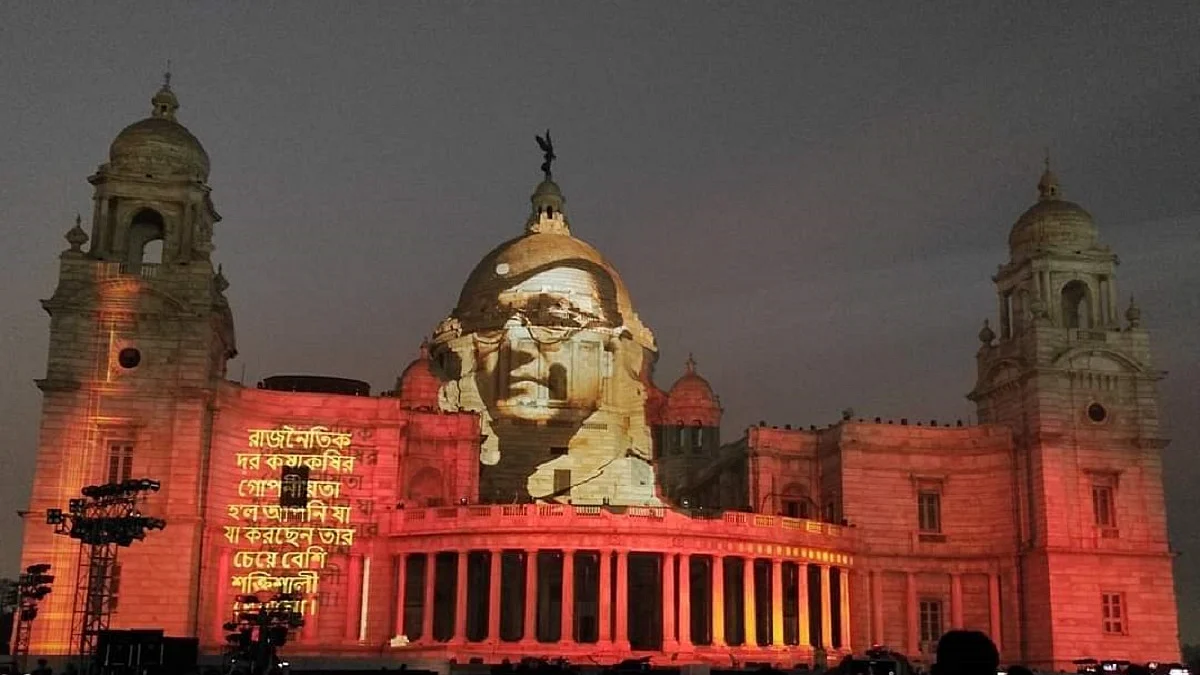‘Jai Shri Ram’ is now used to greet, jeer, threaten and heckle: Mamata right to be offended
The war cry acquires different meanings on different occasions. There is little doubt that on Saturday the slogan was raised to heckle her at the Victoria Memorial in Kolkata

No, the Prime Minister did not say ‘Jai Shri Ram’ at the Victoria Memorial in Kolkata on Saturday evening. He could have. He has said ‘Jai Shri Ram’ often enough and also in Bengal. But unlike BJP supporters and workers present at the function, he possibly was conscious that it was inappropriate.
Over the last 18 hours a section of BJP supporters have been strenuously trying to prove that the slogan is part of Indian culture and an innocuous greeting; and that Mamata Banerjee had no reason to feel offended. “The slogan is part of our culture and if it upsets here, we cannot help it,” a BJP leader of Bengal has been quoted as saying.
The slogan is used not just as a greeting though but also as a war cry and to jeer rivals and minorities. When violent mobs stop members of the minority community and demand that they shout ‘Jai Shri Ram’, try telling them that it is a greeting. Try telling this to opposition Members of Parliament who have been at the receiving end of such ‘greeting’ even inside Parliament. When the Prime Minister and BJP leaders are greeted with cries of ‘Jai Shri Ram’, it is undoubtedly a sectarian but fraternal and rousing greeting. When the same cry was raised when the West Bengal chief minister Mamata Banerjee was invited to speak at the function, it amounted to jeering. And if anybody had any doubt, it would have been dispelled by the peals of laughter by the same section of the crowd when the chief minister refused to address the gathering in protest and returned to her seat.
If Mamata Banerjee’s supporters had also been present, one can imagine what would have followed. Cries of ‘Modi, go back’ and ‘Modi Hai Hai’ would have rent the air and possibly the two groups would have come to blows. But her supporters and Trinamool Congress workers were of course not present. It was not a political event. It was an event to honour Netaji Subhas Chandra Bose and was organized by the Union Ministry of Culture. In a way, the Prime Minister was the host.
Invitations to meetings addressed by the Prime Minister are vetted in advance because of security reasons. Protocol would also have required that the event is attended by select sections of the citizenry, academics, researchers, veterans, historians and cultural activists. By all accounts, they were all there and they of course did not raise the slogan, ‘Jai Shri Ram’. BJP supporters raised it to heckle Mamata Banerjee.
It should not have come as a surprise because the dividing line between the party and the government has increasingly got blurred. There are reports that the state government was not consulted or taken into confidence about the details of the PM’s visit. Sugata Bose, former MP and Director of Netaji Research Centre was informed of the PM’s visit to the Centre at the last moment and the Sound and Light show on Netaji that the Prime Minister unveiled at the Victoria Memorial was sprung as a surprise and a ‘masterstroke’. Cooperative federalism, one might say, was on full display at the event.
It also comes as no surprise that the Prime Minister ignored the unfortunate jeering of the chief minister. He ignored it and refused to spare even a sentence to express his regret and condemn the section of the crowd which had mocked the CM. This was totally in character and what the nation has come to expect from the strong leader.
There is also little doubt that ‘Jai Shri Ram’ is a political slogan and not cultural. It is true that ‘Ram-Ram’ continues to be a popular greeting in the Hindi belt. It is also true that cries of ‘Siyawar Ramchandra Ki Jai’ at recitations from the Ramayana or at theatres enacting parts of the epic are commonplace. But ‘Jai Shri Ram’ was weaponised by the BJP in the 1980s and particularly during its campaign to demolish the Babri mosque at Ayodhya.
The war cry, however, has been raised in the Indian Parliament as well but to jeer the opposition. It is therefore specious to claim that the slogan raised by BJP supporters and workers at Victoria Memorial on Saturday was innocuous and just a greeting.
The jeering was made worse by the emcee asking the raucous section of the audience to calm down and give the chief minister an ‘opportunity’ to speak. It is difficult to know what irked the chief minister more. But in the event, was she wrong in taking umbrage at the insult, remind the audience that official functions should follow a certain dignity and decorum and in refusing to address the gathering in protest?
The West Bengal chief minister would also have reason to feel aggrieved at the propaganda that Bengal till now had failed to honour the memory of Netaji. Kolkata international airport is named after him and so are universities, stadia, auditoriums and avenues besides busts and statues as well as railway stations.
But the real legacy of Netaji lies in forging the secular fabric of India. In 1943 Netaji raised the slogan of ‘Jai Hind’ and the motto of the Indian National Army was Unity (Etihaad), Faith (Etmad) and Sacrifice (Kurbani). He was against communal and caste divides and raised an all-women regiment 77 years ago. Unfortunately, the BJP is not only sectarian, refusing to field Muslim candidates in elections, but also refuses to honour its own commitment to implement 33% women’s reservation in Parliament and state assemblies.
Follow us on: Facebook, Twitter, Google News, Instagram
Join our official telegram channel (@nationalherald) and stay updated with the latest headlines
